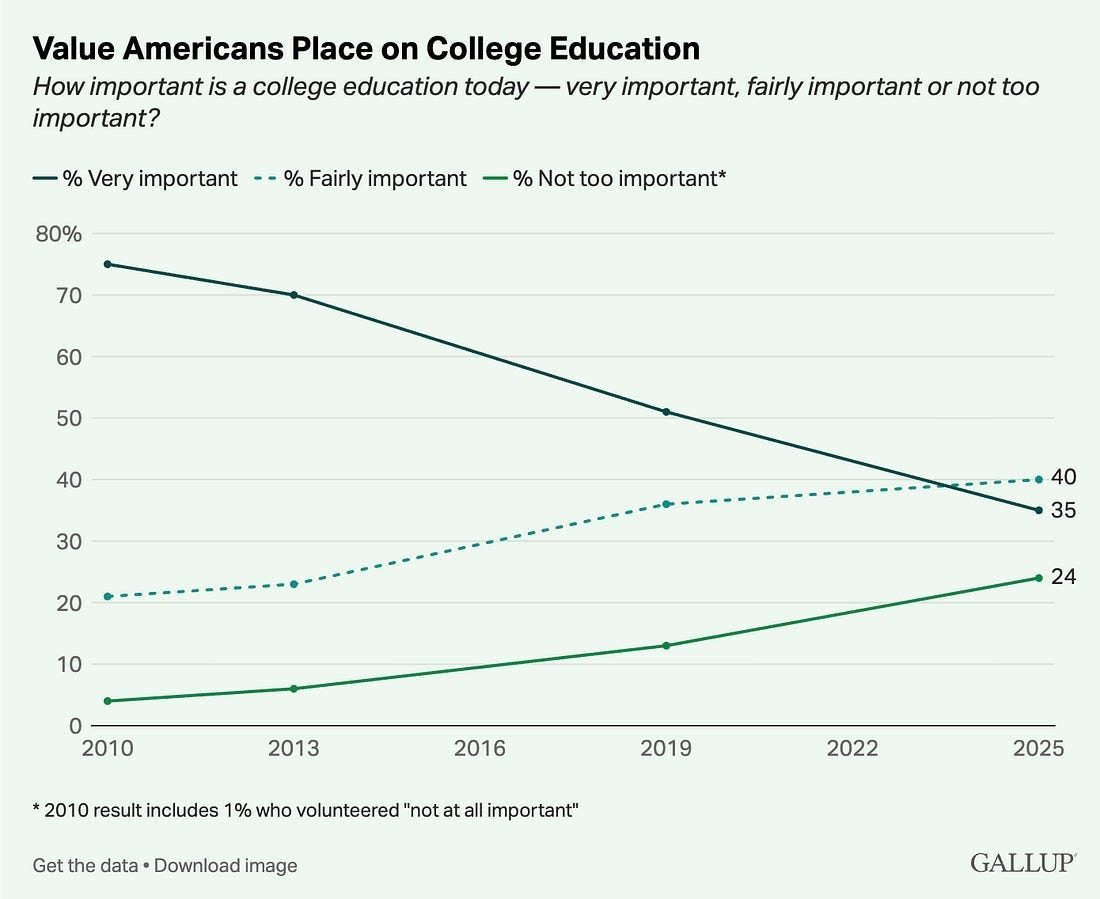20251026
Scientists say they can read the minds of mice by looking at their faces. The findings suggest that it is possible to understand brain function simply by looking at videos. That could open up whole new ways of researching the brain and diagnosing its problems. But it might also present a whole new fear about “mental privacy”, they warn. […] “Having such easy access to the hidden contents of the mind could provide an important boost to brain research. However, it also highlights a need to start thinking about regulations to protect our mental privacy.” - Independent.ie
People: Czech MAGA. Trump/Harvard deal. Speculation bubble? Career management today. Life becomes slop.
Values: Pensioners now earn more than working-age adults. Retired Brits receiving an income boost that beats both GDP growth and inflation. Private equity falls.
Rabbit hole: Changes in dating, sex, rules, base system, marriages, and GenZ divorces.
Tech: Talibans and (cutting off) internet (and Tonga). Shorter issues reporting.
Security: Drones in Poland. And jammer-resistant ones.
Planet: Reading mice’s faces. AI-generated bacteriophages.
AI: Working with wizards. When LLMs become your client.
The hidden AI penalty on workers. And bug hunters.
Integrating AI in IT, not replacing. An EU model?Random: the story of @.
1// Create quarantined space in which traditional methods of learning can be maintained and from which all devices are excluded. Call this “the cloister”. and 2// Inside the cloister, allocate time to a) reading printed books b) discussion of texts and problems c) writing essays and problem-sets with pen and paper, and d) assessment via oral and written examinations.

Digital Loves and Existential Filters
In the bustling town of Everdale, where college degrees had become as trendy as vintage vinyl records but valued about as much as a floppy disk, a new educational app named “ThinkTank” was about to shake things up. The smartly coded creation was so advanced that it could hand out diplomas to anyone who could articulate their morning coffee order half-decently—a feat that could arguably make baristas the new high priests of knowledge. As the app infiltrated local high schools, parents held conflicting visions for their children; 59% wanted them to study philosophy—or perhaps just achieve ‘internet fame’ through TikTok, which clearly had more lasting power than a history degree.
With relationships becoming as complex as a government bill and just as resistant to understanding, Eve, a 22-year-old digital native, had entered into three ‘situationships’ since New Year’s—each one lasting exactly four weeks and precisely enough time to scroll through Valentine’s Day hashtags without a hint of jealousy. She often remarked that dating now felt much like choosing which filters best enhanced on-screen personas. Deciding to explore her ‘icks’—a list that had expanded to cover everything from poor spelling to a love of pineapple on pizza—she played otome games where pixelated princes always understood her like a perfectly functioning AI.
Meanwhile, as whispers of AI leaving human troubles in its digital dust spread through the town—Gartner confidently asserted that in five years, robots would be managing everything from corporate decision-making to cybersecurity duty—the impending reality didn’t seem to faze the local workforce much. Dennis, her neighbor—the last remaining human bug hunter—felt secure in his job, boasting about how he’d taught an AI to catch his coffee run errors but was still consistently beaten in chess. “It’s not about the job,” he’d chirped, “it’s about the **checkmate**!” which in his defense, was true in both contexts.
But in a significant shift, the adorable social media influencers that filled her feed were discovering that their curated lives were beginning to unravel when offline intimacy was no longer upheld. Influencers like Lisa V. faced existential crises; while they had amassed absolute followers, they were ghosted even more frequently than their counterparts in physical dating circles. “Doing things for ‘likes’ can get lonely,” she said, with her followers cheerily commenting that they’d seen her last romantic dinner for one go down a little too smoothly.
As she scrolled through increasingly bizarre yet engaging posts, Eve chuckled at the thought of the world unraveling at an alarming pace, with places like Afghanistan silenced by a tyrant’s internet ban, leaving citizens exiled from both freedom and connection. Or how Ukrainian drones like the Brave1 could revolutionize warfare through sheer distance, making romantic entanglements seem minimal in comparison.
Venting to a friend one rainy evening, Eve stated, “With the uncertainty in love, life, and politics, I think I’d rather build AI to solve my dating problems than have another awkward text exchange where ‘seen’ feels like a personal attack.”
As they sketched out code fragments for the ‘perfect date app,’ an unexpected grace note flashed on her screen. A notification from ThinkTank popped up: “You’re less likely to be ghosted if you simply explain your dating intentions without pretense.” “Who knew?” Eve mused, her finger hovering over the screen. Perhaps the future of relationships had hidden lessons buried beneath data sets and AI algorithms after all. And there it was—truth and tech had just turned dating into a new educational game, where sincerity could out-code the complexity of love—at least until the next viral meme reshaped reality once more, as it invariably did.
Footnote 1: Ironically, they often forgot to turn off their notifications from each other while typing other messages, leaving countless unsent declarations that were possibly lost in the vast cosmos of digital fatigue.
Footnote 2: Research suggests emotional connections may indeed be harder, perhaps requiring a level of vulnerability comparable to walking a tightrope over an abyss—except with fewer circus clowns and a lot more masks.

